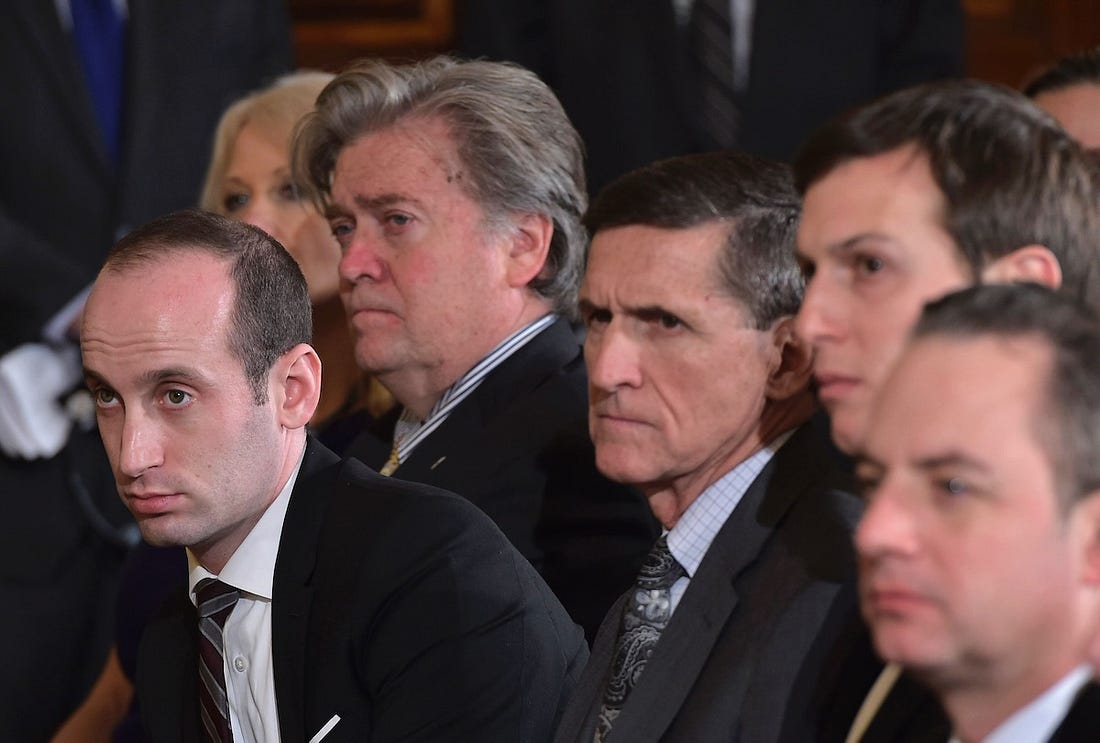|
 |
Thank you for subscribing to Off Message. This is a public post, available to all so please share it widely. If you enjoy this newsletter, I hope you’ll consider upgrading to a paid subscription, for access to everything we do.
Alternatively, if you don’t want a Substack account, you can keep Off Message going with a donation. All support is appreciated, but donations of $75 or larger come with a comped annual subscription—all content unlocked and emailed to the address provided.
You make Off Message possible. Thanks again.
MAGA Disarray And The Accumulated Debt Of Corruption
They'd bring America down rather than face accountability, but accountability is not optional.
Why did Republicans close ranks around Donald Trump in 2016, when they could have salvaged their old party and rebuilt after losing? From the vantage point of today, it’s easy to dismiss the notion. “That’s just what parties do, of course, particularly Republicans in their era of hyperpartisanship.”
But the people who might say that have forgotten how unsettled Republicans were a decade ago. The idea that they might be forced to withdraw support from Trump and accept defeat wasn’t farfetched at the time.
Ted Cruz, in his primetime Republican national convention speech, told GOP voters “vote your conscience.” The audience booed him off the stage and he had to be whisked out of the venue. Paul Ryan and most congressional Republicans withdrew their Trump endorsements after the Access Hollywood tape came to light.
But they fell back in line just as quickly. Hyperpartisanship prevailed. Newt Gingrich introduced hyperpartisanship into the GOP bloodstream more than 30 years ago, but by 2016 it was endemic. Many Republicans had reconceived of themselves as counterrevolutionaries. One of them who would go on to serve in the Trump administration dubbed 2016 “the Flight 93 Election,” invoking the September 11 attacks, and the passengers who rushed the cockpit of the fourth hijacked plane, sacrificing themselves to save the U.S. Capitol from destruction.
This corrupting mentality explains how a disliked insurgent such as Trump attracted a passel of B-list but nevertheless experienced Republican operatives, and why they were willing to skirt laws—even facilitate foreign active measures against the U.S.—to give their party a leg-up in the election.
Nevertheless, had Trump lost in 2016, I suspect we would have bypassed our brush with authoritarianism uneventfully. Trump would have skulked and groused about fraud. But to what end? He lied about Cruz defeating him in the Iowa caucuses that year, and nothing came of it. Kellyanne Conway would’ve gone back to whatever the fuck she had been doing before joining the Trump campaign. Republicans writ large would’ve treated the whole thing as an aberration, better to justify massive resistance to President Hillary Clinton. She’d only won by default after all, because Republican primary voters had glitched.
Four years in, the situation was different. Trump was more constrained in his first term than he is now, but he still engaged in and facilitated a lot of criminal activity. After he became president, Republicans gave themselves over to him, slowly at first, then altogether. When they got creamed in the 2018 midterms, they stifled their misgivings, reasoning they were stuck with Trump through another election cycle whether they liked him or not. And so, with the help of an inner circle of crooks, Trump got to work subverting the 2020 election as well.
Why were these men, some of whom had done real things in their earlier lives, willing to go dirty? Why did they post up at the Willard Hotel and plot a coup after the election? After Trump had wrecked the economy and cost hundreds of thousands of Americans their lives? Political fanaticism can only explain so much. By the end of that year, even many Republicans were relieved that Trump would give way to an experienced public servant.
These men weren’t patriots with warped ideological priorities. They were afraid for their freedom. They were prepared to collapse the whole republic to avoid the accountability they feared was coming.
As it happened, they had little to fear. Joe Biden came to power and appointed an attorney general who shelved or slow walked investigations of the outgoing criminal regime. The main legacy of Merrick Garlandism isn’t failure to mete out justice for past crimes; its that he created incentives for future ones. If they could transgress as far as they did and get away with it, why not go further? A mile is a sum of inches. The accountability void allowed Trump to recover politically, and win office again. A yer in, American public life has become a bacchanal of corruption.
This is the lurking danger as Trump unravels in term two.
The immediate danger is incitement of violence. When Trump is hindfooted, he does things like call for Democrats in Congress to be hanged.
But political violence has been a hallmark of the Trump era all along. There’s a more systemic risk, which stems from the rapid accumulation of criminal exposure. It’s akin to the concept of a debt spiral, but applied to public corruption. Each crime makes MAGA more vulnerable and, thus, willing to take greater risks to avoid accountability, increasing their legal exposure cyclically. Trump and his loyalists are looting faster and faster on borrowed time, and the stakes of losing power keep climbing and climbing.
It’s three
